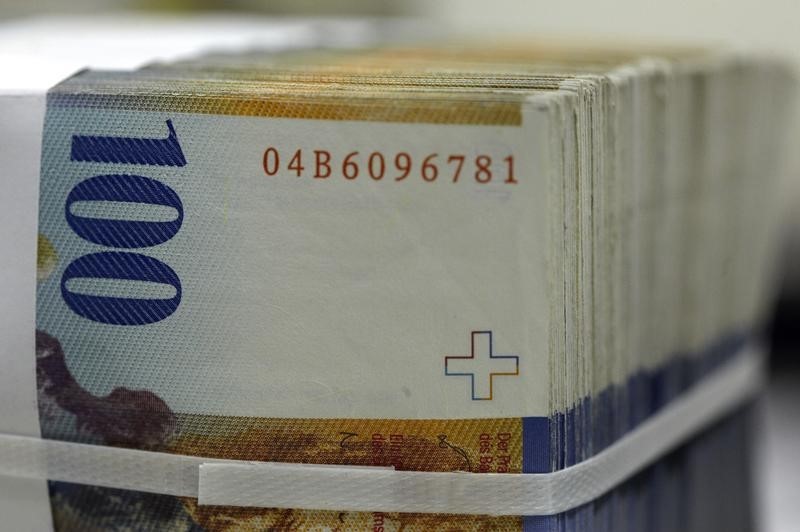Investing.com - The Swiss franc turned lower against the dollar and the euro on Thursday after Swiss National Bank Chairman Thomas Jordan reiterated the currency was overvalued and said the bank would continue to intervene in currency markets to weaken it.
USD/CHF was up 0.57% to 9389 following the remarks from around 0.9345 earlier, while EUR/CHF was at 1.0511 from 1.0475 beforehand.
The drop in the Swissy came after the SNB chairman warned that it is “considerably overvalued” and added that the bank will continue to weaken it by intervening in currency markets and maintaining negative benchmark interest rates and negative rates on franc deposits.
"The global economy has been in a nearly permanent state of crisis for almost eight years," Jordan said. "The pressure on the franc is the mirror image of this."
The comments came during a speech in Lausanne.
The Swiss franc is seen as a safe haven investment because of Switzerland's current account surplus, which means it’s not reliant on foreign investment to fund its budget.
Last week the SNB maintained its rate on sight deposits at minus 0.75% and left the target range for the three-month Libor unchanged at between minus 1.25% and minus 0.25%.
Negative rates effectively mean banks are paying the central bank to hold their money.
Concerns over Greece’s fraught debt negotiations continued to weigh on market sentiment ahead of the looming deadline for Greece to repay €1.6 billion to the International Monetary Fund on June 30.
If Greece misses the payment it risks going into default, which could trigger the country’s exit from the euro area.
Negotiations faltered on Wednesday after Greece’s creditors rejected some of its latest proposed reforms and presented the government with counter proposals for a deal to unlock bailout funds.
Market participants were also looking ahead to a report on U.S. consumer spending due out later in the day amid ongoing speculation over prospects for higher interest rates.
Data on Wednesday showed that a contraction in U.S. first quarter growth was not a severe as initially estimated.
The Commerce Department said the economy contracted at an annual rate of 0.2% in the three months to March, lower than the initial estimate for a 0.7% contraction reported last month.
The upward revision to was due in large part to stronger consumer spending, which was revised up to 2.1% from the initial estimate of 1.8%.
The U.S. dollar index, which measures the greenback’s strength against a trade-weighted basket of six major currencies, was at 95.49, almost unchanged for the day.
